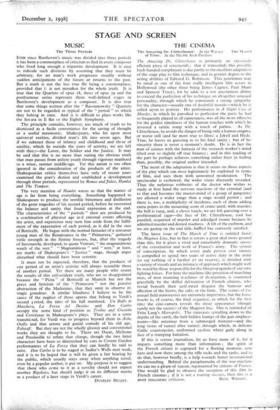The Three Periods
STAGE AND SCREEN
MUSIC
EVER since Beethoven's music was divided into three periods it has been a commonplace of criticism to find in every composer who lived long enough a tripartite development. It is easy to ridicule such divisions by assuming that they must be arbitrary, for no man's work progresses steadily without sudden anticipations of the future or returns to the past. But a truth is not the less true fea- being a commonplace,
provided that is not mistaken for the whole truth. It is true that the Quartets of opus 18, those of opus 59 and the posthumous series represent three well-defined stages in Beethoven's development as a composer. It is also true that some things written after the " Rasoumowsky " Quartets are not 'to be regarded as typical of the " period " to which they belong' in time. And it is difficult to place works like the Sorata in E flat or the Eighth Symphony.
The principle contains, however, too much of truth to be dismissed as a facile convenience for the saving of thought or a useful mnemonic. Shakespeare, who hit upon most universal verities, divided man's life into seven ages. But if we subtract those of infancy and childhood and thcse of senility, which lie outside the years of activity, we are left with three—the Lover, the Soldier and the Justice. It may be said that this is no more than stating the obvious truth that man passes from ardent youth through vigorous manhood to a wiser, serener middle-age. Yet this axiom is too often ignored in the consideration of the products of the artist. Shakespearian critics themselves have only of recent years examined the poet's diction and established a development through three periods, represented by Romeo and Juliet, Hamlet and The Tempest.
The very mention of Hamlet warns us that the matter of age is far from being everything. Something happened to Shakespeare to produce the terrible bitterness and disillusion of the great tragedies of his second period, before he recovered the balance and sanity that found expression at the end. The characteristics of the " periods " then are produced by a combination of physical age aid external events affecting the artist, and experience may turn him aside from the fulfil- ment of the expectation of each period, as it did in the case of Botticelli. He began with the normal fantasies of a sensuous young man of the Renaissance in the " Primavera," gathered virile strength in the Sistine frescoes, but, after the tragedy of Savonarola, developed, to quote Venturi, " the magnanimous wrath of the seer." " Magnanimous " and " seer," at least, are marks of Shakespeare's " Justice " stage, though anger disturbed what should have been serenity.
It must not be expected, therefore, that the products of one period of an artist's activity will always resemble those of another period. Yet there are many people who resent the results of this self-evident truth, who are so disappointed because the " Pieta " of Botticelli at Munich has not the grace and lyricism of the " Primavera " nor the pensive abstraction of the Madonnas, that they omit to observe its tragic grandeur. A similar blindness I believe to be the cause of the neglect of those operas that belong to Verdi's second period, the time of his full manhood. Un Ballo in Maschera, La Forza del Destino and Don Carlos occupy the same kind of position as Troilus and Cressida and Coriolanus in Shakespeare's plays. They are in a sense transitional, for Verdi was to progress beyond them in Aida, Otello and that serene and genial comedy of his old age, Falstaff. But they are not the wholly gloomy and conventional works they arc thought to be. There are Oscar, Melitone and Preziosilla to refute that charge, though the two latter characters have been so diminished by cuts in Covent Garden performances of La Forza that they can hardly be said to exist. Don Carlos is to be staged at Sadler's Wells next week, and it is to be hoped that it will be given a fair hearing by the public, which usually stays away when anything novel, even by a popular author, is put on. My purpose is to suggest that those who come to it as a novelty should not expect another Rigoletto, but should judge it on its different merits as a product of a later stage in Verdi's career.
DYNELEY HUSSEY-


























































 Previous page
Previous page